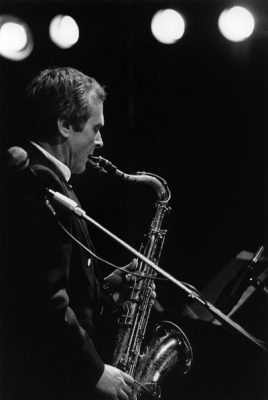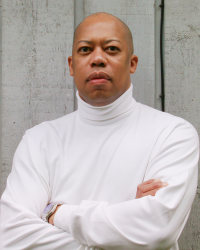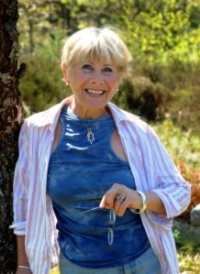.
.
photo by Veryl Oakland

.
Seventeen poets contribute to a collection of jazz poetry reflecting an array of energy, emotion and improvisation
.
.
________
.
.
While. Walking. in. Tel. Aviv . .
It was. while. walking. in . Tel .Aviv.
along Rothschild Boulevard, looking
at all the Bauhaus buildings
I thought about jazz
It struck me that what I liked about the buildings
is what I like about jazz.
My son asked,
“What do you like about these buildings?” “Why do you like jazz?”
“I don’t get it,” he and others say about both, and sometimes so do I.
But I like Bauhaus buildings. I like jazz. We don’t always have to
“get it”. We don’t always have to have a reason why.
.
By Dan Franch
.
.
___
.
.
Whispers
Piano notes lifted
breaking the air
like lightening
bright with heat
beating the earth
with sound
music feeds
the hungry
as dancers drift
darkly
embracing with
whispers
as the jazz
holds everyone
within the grasp
of night
.
by Roger Singer
.
.
___
.
.
Listening to Bill Evans, April 2019
First
the piano
by itself—
after months of darkness
after a Winter of clouds and wind
after discontent
after lies and lies explaining lies
and prayers
and ice
and rivers forgetting to flow
just sitting there under barges and towboats
just sitting there until God says
and the trees just standing there until God says
and the shrinking city just working there until God says
and mud running down the hillsides without end until God says
then Bill Evans—
after months of suffering
undresses in front of my window
shy as a colt
and asks for forgiveness
.
by John Stupp
.
.
___
.
.
On Lonny’s Lament
(for Billy Bang)
beckon / become
there’s the ram’s horn
the golden calf
…..a lament
………become these strings
…………that thought
…………..lament
a horn / a statue
…remain empty / brought to lips
……exhaled
………wears away
………..expelled / womb
…empty crime / gut less self
……….inhale
…the song that sometimes comes out wrong
……..so you do it your way
……….i do it my way
……..this way it becomes a thing. mine. yours.
…….. ……..memory’s.
.
by Steve Dalachinsky
…………………………………originally appeared in Reaching into the Unknown
.
.
___
.
.
The Master of Ceremonies
…………………………………….(for Eddie Jefferson)
With a rough and raspy delivery,
we hear about the situations.
the up side of down,
the pitfalls and pratfalls,
consistent inconsistencies,
successful failures,
cheerful tales of woe,
and the endless search for love.
Wading through the panorama,
the shifting suits and hats,
the up and comers, the formerly were’s,
the shuckers and the jivers.
The dancefloor’s full,
and Eddie’s out front,
spreading the news.
.
By Freddington
.
.
___
.
.
The Blue in the Green
…………………………………….(A Tribute to Miles Davis)
Pensive trumpet,
Your brassy cry is my voice.
Pensive trumpet,
Your long melancholy solo lines summarize my lifetime.
Pensive trumpet,
The space between your notes echoes the emptiness within my soul.
Pensive trumpet,
Only you can pick me back up when life leaves me so low,
For I hear a kindred soul when you blow.
The pensive trumpet,
Yes,
To me this is jazz at its essence;
When one can find serenity even amidst the sadness,
That is,
The blue in the green.
.
By Victor Craven
.
.
___
.
.
Walk in the Garden District, 1984
I got the bebop of a slanted roof line that zooms down from a gable
into a clatter of Ligustrum branches that explode with fragrant buds.
I feel my feet pad asphalt steady on as any bass man
would put it, another straight repetition into night.
I got the trombone moan of an aching cat from
down among garbage cans as car tires whish and sizzle
after an afternoon squall threw its whole kettle down.
That sound of tires picking up rain-fall comes
just as soft as how a drummer brushes along
the rim and glint of a tipped high hat.
Now I got the sway of an off-work waitress that,
as she walks, tilts piano hips this way, then that,
which is all I ever want in this world of ripeness.
She’s almost water-skiing along, that smooth,
and making, yes, her way toward me over
the shimmer of jazz glazed pavement.
I get rhythms going in my bebop heart
so I can sing her a hello soft and low
as I listen to how run-off swirls down
below the street-side drain where rainwater
gathers to flow toward the Gulf of Mexico.
I am talking to her now without singing
what my veins are wailing which is
“Oh baby tell me, oh baby listen to how this 6/4 night
is deeply surging, deep in our baby bones.”
A sub-Saharan wind, a dead pharaoh’s wayward send,
has come to us across the sea, fell upon us in the afternoon.
Blew its full breath into this city from across the Atlantic
the way Coltrane came from so far away in the spirit world
to breath into us, a Magi with gifts inside the long
wind of his saxophone as it belled across
every street-lit night, blew, and blew, and blew.
Who knew Coltrane or a Saharan wind could ever
pick up so much rain and fling it down here in
summer gusts that swayed trees and then refreshed
a thousand, thousand flowers along our chromatic streets.
The moon leans over to riff its slender flute of light
as this beauty lingers at the edge of my voice, trebles
“Would you like to come in. Here’s my door. Come on.
Do you do red? I have red.” For a minute I think
I hear sheets warbling out our names, but we just talk.
Talk, wag tongues, patter till the night
drums me out again and I step back to tiny stones
imbedded in asphalt that tinkle keys in the high octaves
while the moon exhales its flute through black branches.
I’m a little tipsy, unsteady now as a Mingus chorus,
in the dark city where jazz was born and gets reborn.
.
By Ed Ruzicka
.
.
___
.
.
Answering Your Request For Examples of Joy
A dolphin, time and again, soars with abandon;
Coltrane undams a wild, swirling stream of notes;
rambunctious lads and lasses race through tall grass,
voices aflame with delight; Duke Ellington Orchestra
fearlessly unleashes horns into lofty uncharted realms;
Mingus Big Band with raucous daring explores new worlds
of harmony and rhythm; an elderly couple slow-dances
with ecstatic smiles; and a moon, golden, full, blesses
a summer night, as crickets’ voices ascend in evening chorale,
and the young with passionate spontaneity play
hide-and-go-seek, a metaphor for courtships due
in a few years where words of love will ignite
joy’s outpouring in its purest form, a time when life rocks
and rolls, is tumultuous jazz .and total acceptance of another,
when two unite to create bone of bone, flesh of flesh.
.
By Michael L. Newell
.
.
___
.
.
Arrhythmia
You have taken
the rubber mallet
to the cracked wall plaster,
dusting the hardwood
under your knees.
I’m looking to name
your epithalamium
& all I can hear
is the banging of your hammer,
angry with my seclusion.
I am not a carpenter,
not handy with much
but the turn of a phrase,
you don’t want my
fine excuses, in writing
or in law. Too late
for apology, I offer
my irregular heart.
Just a little jazz later
tonight, Moonglow plays
quietly, with soft touch,
my hope & my wish
for you to love me
without good reason;
My Crazy Love
Your Blues in the Night.
.
By Victor Enns
.
.
___
.
.
They Danced the Jazz
A slice of floor
tangled promises
mixed with lies
from the dust of
other places
no pretending for
the present distraction;
secrets shared
few are real
the dance floor
brings together
living art
holding close
slow foot shuffle
on sawdust and sand
the language of song
a warm screen door
window sill flies
half night over
half to go
.
by Roger Singer
.
.
___
.
.
Gypsy
This is not about us,
the us forgotten in early morning gales,
the us too weak to charter flights to nowhere,
and it’s mysteriously not about love’s
grinding lessons,
corrugated roofs set loose in a hurricane,
or malformed freaks in the circus of happiness.
For once,
an eggshell shattered a brick.
Classic.
Both had that coming.
So, when I play for myself
don’t tell me Django Reinhardt was a saint,
unless he’d surrendered a few fingers
just to solo with Sir Duke.
That. I can understand.
.
By Robin Ray
.
.
___
.
.
Lines for Eric Dolphy
I won’t poem you,
set your work to structure and shape.
I won’t pretend to glossify your art—
occupying notes and
quantifying phrases.
These are just lines fluting fitfully as
I wait.
These are just reflections flickering
in the fantasm of your playing.
.
By Michael Yellin
.
.
___
.
.
skip one beat
……………..& then another
your mouth stretches into smile
i have witnessed jazz funerals
the somber trumpet soaring
the swirling call-back of dust
under jazzmen’s nimble feet
your voice bleeds
the skull is not an egg to be cracked
what if all the king’s men
your mouth stretches
hypothalamus cortex cerebellum
like a song a gift of music
with basal ganglia the underlying bass
introduce tumor discordant
a ragged rhythm twisting through the brain
.
By CJ Muchhala
.
.
___
.
.
Caravan
…………………..(for Nathan Davis)
Before we chugged
those jugs of ruby red,
before I moved to New Orleans
and got shacked up
across from Congo Square,
before we dropped bombs
on the tom and snare
of a busted trap set
that once littered
his dust-webbed basement,
Mick and I’d blow off
jive-ass jobs to bang out
big beats on Schenley Park’s
fallen trees, pounding
broken oak branches
on weathered trunks, aping
Blakey chopping wood
on thundering cuts we first heard
in a class led
by Dolphy’s last tenor man.
And when the lights rimming
the hollow began to buzz,
it was enough to share a smoke
and let our sweat cool
before we’d wrap.
.
By Fred Shaw
…………………………………………………originally published in Brilliant Corners
.
.
Photo by. Axel Antas-Bergkvist .on. Unsplash

.
.
Jazz, Hiding
In between Bobby McGee
and the sullen smoke of Mary Jane
That, Cat, was way back in the 60’s
When we lost our jazz to a flower power
blooming with protests
Wynton spotted blazes
rolling down the Pontchartrain
Wading out in the lake, he rescued
Armstrong’s round, hot notes
After giving them recitation, he hung them out to cool
On a line that stretched from Haight to Ashbury
Step it up, Marsalis,
You gotta’ snatch up Bird’s towering notes
They’re escaping on the tail of a sky-bound kite
heading for the clouds over the Bay
Up, up he jumps to grab the bold boys
Then clips their wings
Blowing in the wind, Coltrane’s choruses
Their notes echo on the wind chimes
Ring-a-linging along the Bay,
soon to be smothered by fog
But the fog encasing the Golden Gate
Is no match for Coltrane’s sax on a bridge
Or for Wynton’s devotion
and determination
To save what fell from skies red, white and blue.
And took root in the soils of racism and inequality
to be baptized free and easy,
Spunky, funky jazz
.
By Susandale
.
.
___
.
.
Landscape with the Monongahela River
Lunch hour
walking across town
because I have nothing to do
climbing the Smithfield Street Bridge
humming
Bird’s solos on Red Cross
and Steeplechase
the lines bouncing off the Mon
where the mills once were
oh great river of hot metal
oh great steel valley
when you hit your stride again
in B flat
in E flat
in F
you’ll build 2 or 3 Americas
in the time it took the Empire of Bebop to fall
.
By John Stupp
.
.
___
.
.
Take Five
…….Won’t you stop and take A little time out with me Just take five
……..Stop your busy day And take the time out To see if I’m alive—
…………..Paul Desmond and Noel L. Silverman, instrumental by Dave Brubeck
Her humdrum week
dies on Friday at five.
It’s time to escape
the glass tower,
the typing pool,
the gossiping and back-stabbing,
the too much coffee and cigarettes,
the office jockey smirks,
and the boss’ sexual pantomime.
But she needs to take five,
a few extra drags
outside the powder room.
Her job isn’t over yet—
she’ll need a quick fix
of rouge, powder, and lipstick.
A copious dash
of Yardley’s English Lavender
should diminish the Aqua Net spritz.
She’ll adjust her pencil skirt
before the elevator doors open,
feel freedom’s hot breath
beyond the revolving door.
Ready to take five,
she lights another cigarette
before boarding the IND—
to Greenwich Village
and Harold,
her bespectacled saxophonist
from the Bronx.
Youthful excitement
meets the rush hour.
Like drumbeats,
the subway’s pulse
moves fast,
but happiness moves faster.
It’s getting late,
and she must hurry.
She’s almost twenty-three,
and people will talk
if she doesn’t settle down,
retire her Smith–Corona
and business chic
for Betty Crocker recipes
and a gingham apron,
raise three kids,
and wait on a husband
who might be late again.
In a smoke-filled room,
she forgets about her life,
takes five
for a cigarette,
orders a glass of wine.
She won’t have to douche tonight—
Harold has a rubber.
Worry-free sex
until she meets the right one.
But she’s not a virgin,
and might have a problem.
She takes five
for another cigarette,
drinks another glass of wine,
listens to Harold
make love to his sax,
as he “makes eyes”
at the sassy brunette.
Like drumbeats,
her anxiety moves fast,
but happiness moves faster.
It’s getting late,
and she must hurry.
But a stranger
comes to her table,
lights her cigarette,
and buys her a drink.
The conversation
is getting deeper,
and life slows down
for the next eleven hours.
.
By Patricia Carragon
.
.
___
.
.
Rice Paper Walls Played on Cornet
Walls like rice paper separated our bedrooms
I awoke to the thud of her oak headboard
banging rhythmically against my wall
intermingled with the creaking of springs
I lay there, trying to think of anything
except the empty space beside me
or the pillow still smelling of Camel cigarettes
still smelling of an absent cornet player
The sounds through the wall did not arouse me
and the smell of the pillow did not soothe me
I tried to think of him playing his cornet
Notes running up and down the scale
filling the room with his soft melodies
or mad riffs of cool jazz buffering the walls
drowning out my neighbor’s fucking sounds
Through the rice paper I could hear her
quick panting timed to her partner’s thrust
His loud grunts and the sucking of his teeth
A battle of moans and groans of which I wanted no part
I pulled the pillow to me and inhaled deeply
trying only to hear the cornet’s melodic reprieve
singing sweetly within my head as I lay there
Then I heard her partner come, a resounding OH-SHIT!
and then a deep throated gurgle sound
followed by her not-quite-finished release
Through the rice paper wall
I heard his breathing morph
into a spent lover’s snore
and the sound of her slippers
crossing the floor
.
By Aurora M. Lewis
……………………………previously published on. Up the Staircase
.
.
___
.
.
And Still She Sings
The digits change,
And still she sings.
It brings her solace, validates.
Voice has its own convictions.
She sings because
A throat that’s hoarse or not
Has got its messages
Not from the cords,
But from the chords
And lyrics.
She sings from brain
That rains down on the heart
And whatsoever else is part.
She sings and carries on,
Carries on and sings until one day
Voice comes full stop and goes away,
The traffic cop within from heaven
Steering all.
.
By Arlene Corwin
.
.
___
.
.
Poem for Jim Hall and Bob Brookmeyer
I saw Jim Hall and
Bob Brookmeyer in New York
every night for a week
back in the 70’s
I forget the club
Sweet Basil maybe
I saw the guitar and valve trombone
killing it as the kids say
this was a graceful story of belief and
salvation every night and
a one note samba
where a hundred might do
like a rain drop before you see it and
the bottom line is
they made a bargain with the gods and
I was a lucky man—
later I heard Hall’s solo
on Angel Eyes
with Paul Desmond
on RCA Records
I’ll take that beauty with me to the grave
yank it out of my pocket like a tourist map and
show St. Peter what I remember
Oh Lord—
when I die from too much jazz
spread my ashes on some hill with no winter and
an opening in the trees
for Your sun and sky to play
guitar and valve trombone and
yes
Your Jim and Bob
where the leaves move arm in arm
no longer heavy with the branches of me
.
by John Stupp
.
.
___
.
.
Constant Companions
Sitting on a balcony,
I sip green tea
filled with rippling moonlight.
A cool breeze
washes away the day’s
disappointments and losses.
From a neighbor’s window,
I hear a teenager singing
Warren Zevon’s “Carmelita,”
accompanied by guitar and fiddle.
I shiver, remembering
all the people I have known
who vanished into the arms
of heroin, cocaine, and other
forms of illicit pleasure.
I breathe in cool clarity
of the breeze, wish I could
sing like lad next door,
and whisper the names
of all the dead who lie
in state inside my head
and broken heart. A train
whistle trails a train
into the distance,
and I rise, retreat to my living
room where I can be alone
with my memories, my losses,
my midnight garden of sorrows.
I put on A Love Supreme
and join its mournful full-throated
prayer for all who have been, who are,
who will be, and silently sing
to the universe for the grace
to get through the next day and the next.
Coltrane’s sax soars in prayer for mankind.
.
Michael L. Newell
.
.
.
_______
.
.
.
.
..
Dan Franch, who grew up in the Chicagoland area, currently lives in Estonia. Living a life full of random experiences and adventures and people, he currently owns his own English & coaching company.
.
.
___
.
.

.
Roger Singer is a prolific and accomplished contributing poet who we have proudly published for many years. Singer has had almost 800 poems published in magazines, periodicals and online journals — 400 of which are jazz poems — and has recently self-published a Kindle edition of his book of jazz poetry called Poetic Jazz.
“Jazz poetry flows out with such ease,” Singer writes on his blog. “The people and places, the alleys and sawdust jazz clubs. The stories that bring jazz alive with horns and voices, from sadness and grief to highs at midnight and love gone wrong. The jazz is within us all. Find your poem and feel the music.”
.
.
___
.
.
“Wednesday Night Prayer Meeting.”

.
John Stupp’s third poetry collection.Pawleys Island was published in 2017 by Finishing Line Press. His manuscript Summer Job won the 2017 Cathy Smith Bowers Poetry Prize and will be published in 2018 by Main Street Rag. He lives near Pittsburgh, Pennsylvania. From 1975-1985 he worked professionally as a mediocre jazz guitarist.
.
.
___
.
.

.
Steve Dalachinsky is a New York downtown poet. He is active in the poetry, music, art, and free jazz scene. Dalachinsky’s main influences are the Beats, William Blake, The Odyssey, obsession, socio-political angst, human disappointment, music (especially Jazz), and visual art with leanings toward abstraction. Dalachinsky’s books include A Superintendent’s Eyes (Hozomeen Press 2000), his PEN Award Winning book The Final Nite & Other Poems: Complete Notes From A Charles Gayle Notebook 1987-2006 (Ugly Duckling Presse, 2006), a compendium of poetry written while watching saxophonist Charles Gayle perform throughout New York City in that time period, and Logos and Language, co-authored with pianist Matthew Shipp (RogueArt 2008) and Reaching Into The Unknown, a collaboration with French photographer Jacques Bisceglia (RogueArt 2009).
.
For a complete biography, visit his Wikipedia page.
.
.
___
.
.
Freddington works as a shipper/receiver in Toronto, Canada, and has been a lifelong jazz fan ever since he was “corrupted” as a teenager by Charles Mingus’ “Wednesday Night Prayer Meeting.”
.
.
___
.
.
Victor Cravin resides in Clarksville, Tennessee, just outside of Fort Campbell. He has been writing poetry since the age of 14, and now, after honorably serving for 14 years in the U.S. Army, he is able to devote more time to writing poetry.
.
.
___
.
.

.
Ed Ruzicka has published one full length volume, “Engines of Belief.” His poems have appeared in the Atlanta Review, Rattle, the New Millennium Review, and Chicago Literati, as well as other literary journals and anthologies. Ed lives in Baton Rogue, LA and is an occupational therapist. More works can be found on his website, edrpoet.com.
.
.
___
.
.
Michael L. Newell lives on the south-central Oregon coast. He is a retired teacher.
.
.
___
.
.
.
.
Victor Enns reads and writes poetry and fiction. He lives in Gimli, Manitoba, Canada. His first jazz show was Count Basie, with the Count still at the piano, at the old Civic Auditorium in Winnipeg. Some of these poems are appearing in a new book called Love & Surgery, published September 2019, by Radiant Press in Regina, Saskatchewan. Afghanistan Confessions, poems in the voice of Canadian soldiers, was published in 2014, boy in 2012. Lucky Man (2005) was nominated for the McNally Robinson Manitoba Book of the Year award.
His poems have appeared in Canadian publications and including Rattle (print) and Shot Glass Journal (online) in the U.S. His most memorable performance this century was a mainly Mingus show led by Toronto bassist David Young (originally from Winnipeg) with an eight piece band at the Rex in Toronto.
.
.
___
.
.

.
Robin Ray is the author of .Wetland and Other Stories .(All Things That Matter Press, 2013),. Obey the Darkness: Horror Stories, the novels .Murder in Rock & Roll Heaven .and .Commoner the Vagabond, and one book of non-fiction, .You Can’t Sleep Here: A Clown’s Guide to Surviving Homelessness. .His works have appeared, or is appearing, at . Red Fez, Scarlet Leaf Review, Neologism Poetry Journal, Spark, Aphelion, Bewildering Stories, Picaroon Poetry, The Bangalore Review, The Magnolia Review, .and elsewhere.
.
.
___
.
.
Michael .Yellin .lives. in Merrimack, NH with his fabulous wife, two beautiful daughters, and a little black dog. A relic who is not on Facebook and who still collects CDs,. Michael .teaches composition at Franklin Pierce University and St. Anselm College. He holds a Ph.D in English from Lehigh University.
.
.
___
.
.
CJ Muchhala has absolutely no musical ability but a great deal of appreciation for and love of jazz and blues. She does, however, try to make music with words which have found their way into a number of journals, anthologies, and art/poetry exhibits.
.
.
___
.
.

.
Fred Shaw is a graduate of the University of Pittsburgh, and Carlow University, where he received his MFA. He teaches writing and literature at Point Park University and Carlow University in Pittsburgh, PA. His debut full-length collection, Scraping Away, is forthcoming from CavanKerry Press. A book reviewer and Poetry Editor for Pittsburgh Quarterly, his poem, “Argot,” is featured in the 2018 full-length documentary, Eating & Working & Eating & Working by filmmaker David Bernabo. The film focuses on the lives of local service-industry workers. He lives in Pittsburgh with his wife and rescued hound dog.
.
.
___
.
.

.
Susandale’s poems and fiction are on WestWard Quarterly, Mad Swirl, Penman Review, The Voices Project, and Jerry Jazz Musician. In 2007, she won the grand prize for poetry from Oneswan. The Spaces Among Spaces from languageandculture.org has been on the internet. Bending the Spaces of Time from Barometric Pressure is on the internet now.
.
.
___
.
.
.
.

.
Patricia Carragon’s recent publications include Bear Creek Haiku, First Literary Review-East, A Gathering of the Tribes, The Café Review, Muddy River Poetry Review, Poetrybay, and Krytyka Literacka. Her latest books are The Cupcake Chronicles (Poets Wear Prada) and Innocence (Finishing Line Press). Patricia hosts the Brooklyn-based Brownstone Poets and is the editor-in-chief of its annual anthology. She is an executive editor for Home Planet News Online.
.
.
___
.
.

.
Aurora M. Lewis is a retiree. In her 50’s she received a Certificate in Creative Writing-General Studies, with honors from UCLA. Her poems, short stories, and nonfiction have been accepted by.The Literary Hatchet, Gemini Magazine, Persimmon Tree, Jerry Jazz Musician, and The Blue Nib, to name only a few. Aurora’s poetry was nominated by Gemini Magazine in 2010 for Best of the Net and a Pushcart Prize in 2011. The Literary Hatchet has nominated her for the current Pushcart Prize.
.
.
___
.
.

.
Arlene Corwin has been a jazz musician since 1951, and continues to work as a pianist/singer in Sweden, where she now resides. Her mother owned a jazz club with Slim Gaillard in Hempstead, Long Island called The Turf. She has published 17 books of poetry.
.
.
.
.





























I’m just crazy about your collection Mr Maita! I never dreamed so many jazz lovers could show up with such jazz inspired poetry. Sublime! I’m so happy to be a part of this, I could scream (or sing, or play) with uttermost joy.
Thanking you,
Arlene Corwin?
Some striking lines from this month’s collection of poems:
(I apologize for formatting problems caused by cutting and pasting.)
There is a tremendous amount of impressive work in this month’s poetry collection, far too much to comment on each and every work of interest. Here instead are some lines that grabbed my interest.
“While Walking in Tel Aviv”:
“I don’t get it,” he and others say about both, and sometimes so do I.
But I like Bauhaus buildings. I like jazz. We don’t always have to
“get it”. We don’t always have to have a reason why.
–Dan Franch
“Whispers”:
as the jazz
holds everyone
within the grasp
of night
— Roger Singer
“On Lonny’s Lament”
the song that sometimes comes out wrong
……..so you do it your way
……….i do it my way
……..this way it becomes a thing. mine. yours.
……..……..memory’s.
–Steve Dalachinsky
“The Master of Ceremonies”
Wading through the panorama,
the shifting suits and hats,
the up and comers, the formerly were’s,
the shuckers and the jivers.
The dancefloor’s full,
and Eddie’s out front,
spreading the news.
–Freddington
“The Blue in the Green”
To me this is jazz at its essence;
When one can find serenity even amidst the sadness,
That is,
The blue in the green.
–Victor Craven
“Walk in the Garden District, 1984”
I’m a little tipsy, unsteady now as a Mingus chorus,
in the dark city where jazz was born and gets reborn.
–Ed Ruzicka
“Arrhythmia”
tonight, Moonglow plays
quietly, with soft touch,
my hope & my wish
for you to love me
without good reason;
My Crazy Love
Your Blues in the Night.
— Victor Enns
“Gypsy”
So, when I play for myself
don’t tell me Django Reinhardt was a saint,
unless he’d surrendered a few fingers
just to solo with Sir Duke.
That I can understand.
–Robin Ray
“Lines for Eric Dolphy”
These are just reflections flickering
in the fantasm of your playing.
–Michael Yellin
“skip one beat
……………..& then another”
i have witnessed jazz funerals
the somber trumpet soaring
the swirling call-back of dust
under jazzmen’s nimble feet
— CJ Muchhala
“Caravan”
Mick and I’d blow off
jive-ass jobs to bang out
big beats on Schenley Park’s
fallen trees, pounding
broken oak branches
on weathered trunks, aping
Blakey chopping wood
on thundering cuts we first heard
in a class led
by Dolphy’s last tenor man.
–Fred Shaw
“Jazz, Hiding”
But the fog encasing the Golden Gate
Is no match for Coltrane’s sax on a bridge
–Susandale
“Landscape with the Monongahela River”
oh great river of hot metal
oh great steel valley
when you hit your stride again
in B flat
in E flat
in F
you’ll build 2 or 3 Americas
in the time it took the Empire of Bebop to fall
–John Stupp
“Take Five”
Like drumbeats,
her anxiety moves fast,
but happiness moves faster.
–Patricia Carragon
“Rice Paper Walls Played on Cornet”
I tried to think of him playing his cornet
Notes running up and down the scale
filling the room with his soft melodies
or mad riffs of cool jazz buffering the walls
drowning out my neighbor’s fucking sounds
— Aurora M. Lewis
“And Still She Sings”
She sings because
A throat that’s hoarse or not
Has got its messages
–Arlene Corwin
” Poem for Jim Hall and Bob Brookmeyer”
when I die from too much jazz
spread my ashes on some hill with no winter and
an opening in the trees
for Your sun and sky to play
guitar and valve trombone
–John Stupp
Thank you Joe Maita for another stellar edition. So many cool writers.
Michael L. Newell, you’ve selected my favorite line! Gracias. I sometimes get into my “Mad Men” mood when I write some of my jazz pieces.
Patricia
John Stupp, I loved the jazzy Bill Evans poem!